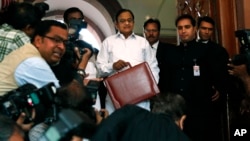NEW DELHI —
India’s finance minister is pledging to revive economic growth by trimming the country’s fiscal deficit. He also says India is in critical need of foreign investment to reverse the worst slowdown in a decade for Asia’s third largest economy.
Speaking to parliament during the presentation of the country's annual budget, Finance Minister P. Chidambaram vowed to cut India’s fiscal deficit to 4.8 per cent in the next fiscal year. He said the country needs to make tough spending decisions.
"I have no choice but to rationalize expenditure. We took a dose of bitter medicine. It seems to be working," he said.
India’s fiscal and current deficits have raised concern of a downgrade by rating agencies.
However, government spending will rise by about 16 per cent in the next year. To meet those expenses, the Finance Minister announced a temporary tax on the super rich - those with an annual income of about $200,000 - and on local companies with an income of over $2 million.
Minister Chidambaram acknowledged that the Indian economy, which has slowed to a decade-low of about five percent, is in a trough. He says restoring high growth is a challenge, but that he is optimistic about the future.
"There is no reason for gloom or pessimism," he said. "Even now, of the large countries of the world, only China and Indonesia are growing faster than India in 2012-13. And in 2013-14, if we grow at the rate projected by many forecasters, only China will grow faster than India.”
The government estimates that India’s economy will grow by over six percent in the next fiscal year, after slipping to five percent in the last year.
Chidambaram focused on winning back foreign investors assuring them that India will be business friendly.
He pointed out that India needs $75 billion to finance its current account deficit, or trade imbalance, which has grown rapidly due to massive imports of oil, gold and coal.
"I have been at pains to state over and over again that India does not have the choice between welcoming and spurning foreign investment. Foreign investment is an imperative," he said.
Foreign investment fell last year as investors were alienated by a series of unexpected tax proposals, by corruption scandals and India’s tough regulatory regime. Opposition parties have also opposed the government’s decision to open the retail sector to foreign supermarkets.
Prime Minister Manmohan Singh expressed hope that the measures announced will revive the economy and that India will return to growth levels of about eight percent in two to three years.
Forecasters say returning India to those levels of growth will depend on the government’s willingness to reduce spending, initiate reforms and control inflation.
Speaking to parliament during the presentation of the country's annual budget, Finance Minister P. Chidambaram vowed to cut India’s fiscal deficit to 4.8 per cent in the next fiscal year. He said the country needs to make tough spending decisions.
"I have no choice but to rationalize expenditure. We took a dose of bitter medicine. It seems to be working," he said.
India’s fiscal and current deficits have raised concern of a downgrade by rating agencies.
However, government spending will rise by about 16 per cent in the next year. To meet those expenses, the Finance Minister announced a temporary tax on the super rich - those with an annual income of about $200,000 - and on local companies with an income of over $2 million.
Minister Chidambaram acknowledged that the Indian economy, which has slowed to a decade-low of about five percent, is in a trough. He says restoring high growth is a challenge, but that he is optimistic about the future.
"There is no reason for gloom or pessimism," he said. "Even now, of the large countries of the world, only China and Indonesia are growing faster than India in 2012-13. And in 2013-14, if we grow at the rate projected by many forecasters, only China will grow faster than India.”
The government estimates that India’s economy will grow by over six percent in the next fiscal year, after slipping to five percent in the last year.
Chidambaram focused on winning back foreign investors assuring them that India will be business friendly.
He pointed out that India needs $75 billion to finance its current account deficit, or trade imbalance, which has grown rapidly due to massive imports of oil, gold and coal.
"I have been at pains to state over and over again that India does not have the choice between welcoming and spurning foreign investment. Foreign investment is an imperative," he said.
Foreign investment fell last year as investors were alienated by a series of unexpected tax proposals, by corruption scandals and India’s tough regulatory regime. Opposition parties have also opposed the government’s decision to open the retail sector to foreign supermarkets.
Prime Minister Manmohan Singh expressed hope that the measures announced will revive the economy and that India will return to growth levels of about eight percent in two to three years.
Forecasters say returning India to those levels of growth will depend on the government’s willingness to reduce spending, initiate reforms and control inflation.




